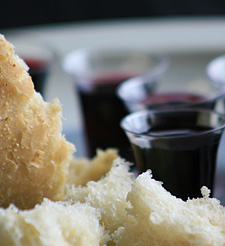Sydney Synod has overwhelmingly restated its principled support for lay and diaconal administration of the Lord's Supper.
More significantly - in what supporters said is "a great outcome' for women deacons - the motion also "accepts' the argument that there is no longer any legal impediment to deacons officiating at Holy Communion given the wording of The Ordination Service for Deacons Canon 1985 and the repeal of the 1662 Act of Uniformity by a recent General Synod Canon.
However the motion itself does nothing to change the legal situation.
"We don't make law or change law in a motion," said the Bishop of North Sydney, Glenn Davies, in moving the motion "we merely express our view."
Bishop Davies said he believes there is “nothing the Archbishop can do to prevent a deacon administering the Lord's Supper”.
But added that via the motion Synod cannot approve lay people presiding at Holy Communion at Sunday services in Sydney Diocese.
"It would require a bishop’s licence," Bishop Davies explained. "The Archbishop will not license a lay person at this time."
Win for women deacons
 Archdeacon for Women's Ministry, Narrelle Jarrett, seconded the motion saying she wanted Synod to understand the way the ministry of deacons " male and female " is currently restrained.
Archdeacon for Women's Ministry, Narrelle Jarrett, seconded the motion saying she wanted Synod to understand the way the ministry of deacons " male and female " is currently restrained.
Women can be deacons in Sydney Diocese but not presbyters (priests).
Archdeacon Jarrett said the current situation “seriously diminishes the ministry of women” explaining the right to administer the Lord's Supper “is forbidden them for entirely unbiblical reasons”.
"Why can't women deacons administer the Lord's Supper in a girls’ school or a womens’ prison? Do we really think that a male priest can only administer this Sacrament?"
Archdeacon Jarrett also said the current situation also caused problems in multi-site parishes, when congregations are led by deacons.
A number of new church plants in Sydney Diocese, including some that are extra-parochial, are led by male deacons.
The current policy makes it difficult for these churches to regularly provide the Lord's Supper to members.
Amendments lost
A string of amendments were suggested seeking to water down the motion.
All were overwhelmingly defeated on voices.
The Rev Andrew Katay from Ashfield sought to merely “receive” the report on the legal advice.
He said “it’s not honourable” to pursue a change by just doing “a clever thing with words”.
"The change needs to occur in the right way," he said.
Judge Chris Armitage from Killara sought to remove the word “lay” from the motion.
He said any move to approve lay administration would breach Section 71 of the Constitution of the Anglican Church of Australia and he “guaranteed” it would “end up in the secular courts”.
The Rev Dr Tim Foster from Leichhardt sought to delete clause (c): “affirms that the Lord's Supper in this diocese may be administered by persons other than presbyters”.
"It pretends to be innocuous but opens a Pandora's box," he said.
Bishop Peter Tasker supported Dr Foster's amendment saying that he was concerned the motion would impact Sydney's relationship with GAFCON bishops.
"I am not arguing that we ask GAFCON bishops for permission," he said.
"I personally made a commitment" that we would seek to put on paper our reasons for moving in this direction. They simply ask to give them space to read and understand our position before we act."
A key part of the motion includes sending a book published by the Anglican Church League in order to explain Sydney Diocese’s theological viewpoint to GAFCON bishops.
An amendment from Lis Boyce asking that this book also be sent to Australian bishops was withdrawn on advice that it had already been sent to them.
A real diaconate
The Dean of Sydney, Phillip Jensen, spoke against each amendment in turn and in support of the original motion.
The motion, he said "doesn't say what we are going to do… just what we believe".
More significantly he explained the rationale for Sydney's ongoing plan to broaden the diaconate.
"We want to turn the diaconate into a real diaconate" We don't want to specialise the presbyters in administering the Lord's Supper… but we want them to specialise in their incumbency."
In his concluding speech, Bishop Davies agreed: "It’s much better to make the diaconate a real diaconate… to allow women to have that fullness of ministry of Word and Sacrament.. that would be a great outcome."
"We must remember that diaconal presidency occurred in Kenya for years and no one blinked an eye " I confirmed this with Archbishop Gitari [of Kenya]."























